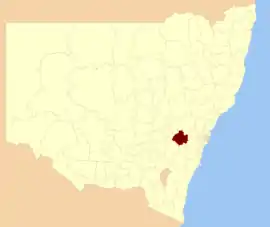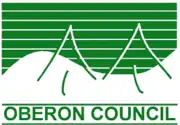| Oberon Council New South Wales | |||||||||||||||
|---|---|---|---|---|---|---|---|---|---|---|---|---|---|---|---|
 Location in New South Wales | |||||||||||||||
| Coordinates | 33°43′S 149°52′E / 33.717°S 149.867°E | ||||||||||||||
| Population |
| ||||||||||||||
| • Density | 1.4490/km2 (3.7530/sq mi) | ||||||||||||||
| Area | 3,659 km2 (1,412.7 sq mi) | ||||||||||||||
| Mayor | Mark Kellam (Independent) | ||||||||||||||
| Council seat | Oberon[3] | ||||||||||||||
| Region | Central West | ||||||||||||||
| State electorate(s) | Bathurst | ||||||||||||||
| Federal division(s) | Calare | ||||||||||||||
 | |||||||||||||||
| Website | Oberon Council | ||||||||||||||
| |||||||||||||||
Oberon Council is a local government area in the Central West region of New South Wales, Australia.
The mayor of Oberon Council is Cr. Mark Kellam, an independent politician.
Localities
Oberon Council includes the towns / villages of Oberon, Black Springs, Shooters Hill, Edith, O'Connell, Hazelgrove, Mount David, Jenolan and Burraga. It also includes the minor localities of Arkstone, Duckmaloi, Essington, Isabella and Porters Retreat.[4]
Heritage listings
The Oberon Council has a number of heritage-listed sites, including:
- Jenolan Caves Road: Jenolan Caves[5]
- Lindlegreen Barn O'Connell
- O'Connell Hotel
- 6 Foot Track.
- Yerranderie.
- Oberon, 124 Oberon Street: Malachi Gilmore Memorial Hall[6]
- Ramsgate Cottage.
- Oberon, Tarana-Oberon railway: Oberon railway station[7]
Demographics
According to the Australian Bureau of Statistics there:[8]
- were 5,503 people as at 30 June 2006, the 125th largest Local Government Area in New South Wales. It was equal to less than 0.1% of the New South Wales population of 6,827,694
- was an increase of 60 people over the year to 30 June 2006, the 99th largest population growth in a Local Government Area in New South Wales. It was equal to 0.1% of the 58,753 increase in the population of New South Wales
- was, in percentage terms, an increase of 1.1% in the number of people over the year to 30 June 2006, the 41st fastest growth in population of a Local Government Area in New South Wales. In New South Wales the population grew by 0.9%
- was an increase in population over the 10 years to 30 June 2006 of 648 people or 13% (1.3% in annual average terms), the 32nd highest rate of a Local Government Area in New South Wales. In New South Wales the population grew by 622,966 or 10% (1.0% in annual average terms) over the same period.
Council
Current composition and election method
Oberon Council is composed of nine councillors elected proportionally as a single ward. All councillors are elected for a fixed term of office. The mayor is elected by the councillors at the first meeting of the council for a 2-year term. The most recent election was held on 4 December 2021. The makeup of the council is as follows:[9]
| Party | Councillors | |
|---|---|---|
| Independents and Unaligned | 9 | |
| Total | 9 | |
The current Council, elected in 2022, in order of result is:[9]
| Councillor | Party | Notes | |
|---|---|---|---|
| Mark Kellam | Independent | Mayor | |
| Clive Macarthy | Unaligned | ||
| Ian Tucker | Unaligned | ||
| Katy Graham | Independent | ||
| Lauren Trembath | Independent | ||
| Andrew McKibbin | Unaligned | ||
| Mick McKecknie | Unaligned | ||
| Bruce Watt | Independent | ||
| Helen Hayden | Unaligned | ||
References
- ↑ Australian Bureau of Statistics (27 June 2017). "Oberon (A)". 2016 Census QuickStats. Retrieved 7 July 2017.
- ↑ "3218.0 – Regional Population Growth, Australia, 2017–18". Australian Bureau of Statistics. 27 March 2019. Retrieved 27 March 2019. Estimated resident population (ERP) at 30 June 2018.
- ↑ "Oberon Council". Division of Local Government. Retrieved 9 November 2006.
- ↑ "Oberon Council Strategic Planning Statement" (PDF). Oberon Council. May 2020. Retrieved 13 June 2021.
- ↑ "Jenolan Caves Reserve". New South Wales State Heritage Register. Department of Planning & Environment. H01698. Retrieved 18 May 2018.
 Text is licensed by State of New South Wales (Department of Planning and Environment) under CC-BY 4.0 licence.
Text is licensed by State of New South Wales (Department of Planning and Environment) under CC-BY 4.0 licence. - ↑ "Malachi Gilmore Memorial Hall". New South Wales State Heritage Register. Department of Planning & Environment. H01680. Retrieved 18 May 2018.
 Text is licensed by State of New South Wales (Department of Planning and Environment) under CC-BY 4.0 licence.
Text is licensed by State of New South Wales (Department of Planning and Environment) under CC-BY 4.0 licence. - ↑ "Oberon Railway Station group". New South Wales State Heritage Register. Department of Planning & Environment. H01215. Retrieved 18 May 2018.
 Text is licensed by State of New South Wales (Department of Planning and Environment) under CC-BY 4.0 licence.
Text is licensed by State of New South Wales (Department of Planning and Environment) under CC-BY 4.0 licence. - ↑ "Regional Population Growth, Australia, 2005–06 (catalogue no.: 3218.0)". Australian Bureau of Statistics. Retrieved 12 March 2007.
- 1 2 "Summary of Group and Candidate First Preference Votes". Local Government Elections 2012. Electoral Commission of New South Wales. 8 September 2012. Retrieved 17 October 2012.